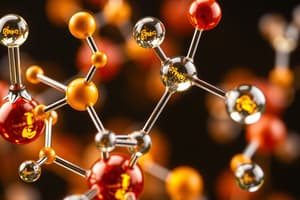Podcast
Questions and Answers
Alcohols are represented by the general formula ______H, where R- stands for a hydrocarbon radical.
Alcohols are represented by the general formula ______H, where R- stands for a hydrocarbon radical.
RO
Phenols have one of the hydrogen atoms replaced by a ______ group.
Phenols have one of the hydrogen atoms replaced by a ______ group.
aryl
Aldehydes and ketones are both characterized by one ______ group (C=O).
Aldehydes and ketones are both characterized by one ______ group (C=O).
carbonyl
Aldehydes are produced from the mild oxidation of ______ alcohols.
Aldehydes are produced from the mild oxidation of ______ alcohols.
Ketones are oxidation products of ______ alcohols.
Ketones are oxidation products of ______ alcohols.
Aldehydes and ketones are known for their ______ reactions across the double bond.
Aldehydes and ketones are known for their ______ reactions across the double bond.
The difference in ______ between carbon and oxygen leads to a considerable contribution of dipolar resonance forms.
The difference in ______ between carbon and oxygen leads to a considerable contribution of dipolar resonance forms.
The carboxylic group (-COOH) is the functional group of ______ acids.
The carboxylic group (-COOH) is the functional group of ______ acids.
The polarity of the -OH bond is greatly increased, and the tendency to release a ______ (a property called acidity) is higher than in alcohols or even in phenols.
The polarity of the -OH bond is greatly increased, and the tendency to release a ______ (a property called acidity) is higher than in alcohols or even in phenols.
Carboxylic acids are soluble in less polar solvents like ______, alcohol, benzene and others.
Carboxylic acids are soluble in less polar solvents like ______, alcohol, benzene and others.
The objective is to distinguish the organic compounds based on their characteristic reactions with different ______ reagents.
The objective is to distinguish the organic compounds based on their characteristic reactions with different ______ reagents.
The next activity is to test the ______ of the samples contained in test tubes 5 & 6.
The next activity is to test the ______ of the samples contained in test tubes 5 & 6.
Flashcards are hidden until you start studying
Study Notes
Carboxylic Acids
- The carboxylic group (-COOH) is the functional group of carboxylic acids.
- The polarity of the –OH bond is greatly increased due to the interaction between the hydroxyl group and the carbonyl group, resulting in a higher tendency to release a proton (acidity).
- Carboxylic acids can form hydrogen bonds with each other and with other molecules.
Oxygen-Containing Organic Compounds
- Alcohols, phenols, aldehydes, ketones, and carboxylic acids are oxygen-containing organic compounds.
Alcohols
- Alcohols are derivatives of water, with a similar structure wherein one of the hydrogen atoms is replaced by an alkyl group.
- Alcohols are represented by the general formula ROH, where R- stands for a hydrocarbon radical.
Phenols
- Phenols have one of the hydrogen atoms replaced by an aryl group.
- The –OH group is directly attached to an aromatic ring.
Aldehydes
- Aldehydes are characterized by one carbonyl group (C=O).
- Aldehydes have at least one hydrogen bonded to the carbonyl carbon.
- Aldehydes are produced from the mild oxidation of primary alcohols.
- Aldehydes are easily oxidized to carboxylic acids or their salts.
Ketones
- Ketones are characterized by one carbonyl group (C=O).
- Ketones have alkyl or aryl group bonded to the carbonyl group.
- Ketones are oxidation products of secondary alcohols.
- Ketones are generally not affected by oxidizing agents.
Reactivity of Aldehydes and Ketones
- Addition reactions across the double bond are the characteristic reactions of aldehydes and ketones.
- This type of reactivity is due to the strongly polar carbonyl group of these compounds.
Studying That Suits You
Use AI to generate personalized quizzes and flashcards to suit your learning preferences.




